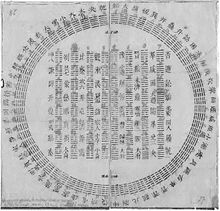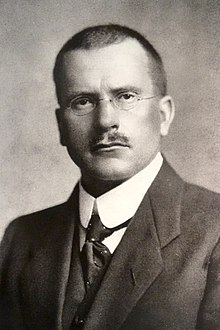I Ching
Appearance


And many deeds of the past,
In order to strengthen his character thereby.

The superior man sets his life in order
And examines himself.
I Ching (易經), also known as the Book of Changes (周易), is a Chinese classical text believed to have been written by Fu Xi. Originally a divination manual in the Western Zhou period (1000 - 750 BC), the I Ching was transformed over the course of the Warring States and early imperial periods (500 - 200 BC) into a cosmological text with a series of philosophical commentaries known as the "Ten Wings". (c. 2800 BCE).
Quotes
[edit]- Unless otherwise noted, the translations used are those of Richard Wilhelm, rendered into English by Cary F. Baynes (1950), Volume 19 of the Bollingen series
- 君子終日乾乾
- All day long the superior man is creatively active.
- ䷀ 1 The Creative
- It is not I who seek the young fool;
The young fool seeks me.- ䷃ 4 Youthful Folly
- To nourish oneself on ancient virtue induces perseverance.
- ䷅ 6 Conflict
- An army must set forth in proper order.
If the order is not good, misfortune threatens.- ䷆ 7 The Army
- The superior man falls back upon his inner worth
In order to escape the difficulties.
He does not permit himself to be honored with revenue.- ䷋ 12 Standstill [Stagnation]
- No boasting of wealth before one's neighbor.
- ䷎15 Modesty
- It is unlucky to sound off about happiness.
- ䷏ 16 (trans. by Thomas Cleary)
- Those above can ensure their position
Only by giving generously to those below.- ䷖ 23 Splitting Apart
- The superior man acquaints himself with many sayings of antiquity
And many deeds of the past,
In order to strengthen his character thereby.- ䷙ 26 The Taming Power of the Great
- If you are sincere, you have success in your heart,
And whatever you do succeeds.- ䷜ 29 The Abysmal (Water)
- The great man, by perpetuating this brightness,
Illumines the four quarters of the world.- ䷝ 30 The Clinging, Fire
- Thus the superior man:
If he sees good, he imitates it;
If he has faults, he rids himself of them.- ䷩ 42 Increase
- The superior man encourages the people at their work,
And exhorts them to help one another.- ䷯ 48 The Well
- When one's own day comes, one may create revolution.
- ䷰ 49 Revolution (Molting)
- Change proves true on the day it is finished.
- 49 (trans. by Thomas Cleary)
- Thus in fear and trembling
The superior man sets his life in order
And examines himself.- ䷲ 51 The Arousing (Shock, Thunder)
- Thomas Clear's translation: Cultured people practice self-examination with trepidation and fear.
- ䷳ KEEPING STILL. Keeping his back still
So that he no longer feels his body.
He goes into his courtyard
And does not see his people.
No blame.
True quiet means keeping still when the time has come to keep still, and going forward when the time has come to go forward. In this way rest and movement are in agreement with the demands of the time, and thus there is light in life.
The hexagram signifies the end and the beginning of all movement.
- Thus the superior man
Understands the transitory
In the light of the eternity of the end.- ䷵ 54 The Marrying Maiden
- Perseverance brings good fortune.
- ䷿ 64 Before Completion
Quotes about the I Ching
[edit]- Sorted alphabetically by author or source

- First take up the words,
Ponder their meaning,
Then the fixed rules reveal themselves.
But if you are not the right man,
The meaning will not manifest itself to you.- Da Zhuan, quoted in Change: Eight Lectures on the I Ching by Hellmut Wilhelm (Pantheon Books, 1960), p. 65
- The Book of Changes, in a word, is a kind of geometry of mythology... It tells of the readiness of time and the art of moving with its tides, rocking with the waves, and is the most important statement remaining to us of that aspect of ancient Chinese thought which relates the individual to the order of the outer world.
- Joseph Campbell, The Masks of God: Oriental Mythology (Penguin Books, 1976), p. 413
- The I Ching is the world's oldest guide to 'the virtuous life'.
- Martin Cohen, 101 Ethical Dilemmas (2007), p. xiii
- The purpose of the I Ching or the tarot … is to help you get access to yourself, by providing ambiguity for you to interpret. And this quality of ambiguity is shared with nearly all forms of divination — cast artifacts, or entrails, or weather formations, or events such as the flight of birds, that one could choose either to see as "omens" or to ignore.
The very thing that makes these divination techniques seem so unscientific is what makes it possible for them to work.- Michael Crichton, in Travels (1988)

- There is a book called the I-Ching, I'm not trying to push it, I don't want to talk about it, but it's the only thing that is amazingly true, period, not just for me. Anybody would know it. Anybody that ever walks would know it. It's a whole system of finding out things, based on all sorts of things. You don't have to believe in anything to read it, because beside being a great book to believe in it's also very fantastic poetry.
- I threw the I-Ching yesterday, it said there might be some thunder at the well.
- Bob Dylan, "Idiot Wind", Blood On The Tracks, New York Session (1974)

- Whatever you do, be sure to let your readers know that every sentence can be read in an almost infinite number of ways! That is the secret of the book. No one will ever know what it really means!
- David Hawkes, in his last conversation with John Minford in the summer of 2009, as quoted in John Minford (trans.), I Ching (Viking Penguin, 2014), introduction
- The I Ching does not offer itself with proofs and results; it does not vaunt itself, nor is it easy to approach. Like a part of nature, it waits until it is discovered. It offers neither facts nor power, but for lovers of self-knowledge, of wisdom—if there be such—it seems to be the right book. To one person its spirit appears as clear as day; to another, shadowy as twilight; to a third, dark as night. He who is not pleased by it does not have to use it, and he who is against it is not obliged to find it true. Let it go forth into the world for the benefit of those who can discern its meaning.
- Its name, "The Book of Changes," is suggestive; and we find throughout its contents the vague idea of change replaced by the more definite one of "transformation," the key-word of alchemy... "The diagrams," [Confucius] says again, "comprehend the profoundest secrets of the universe; and the power of exciting the various motions of the universe depends on their explanation;—the power to effect transmutation depends on the understanding of the diagrams of changes." Here, in a word, is the...general object of Chinese students of alchemy.
- William Alexander Parsons Martin, The Chinese: their Education, Philosophy, and Letters (1880)
- The origins of astronomy can be found in the I Ching. Using the principle of astronomy, calendrical studies, and the I Ching to understand thoroughly the meaning of the unity of heaven and man is difficult. Nevertheless, we should study the I Ching little by little and fuse it with the principles of astronomy and calendrical studies. Then we can investigate the similarities in all things.
- Nishikawa Joken, as quoted in The I Ching in Tokugawa Thought and Culture (2000) by Wai-Ming Ng, p. 139
- The "Book of Changes" is regarded with almost universal reverence, both on account of its antiquity and also the unfathomable wisdom which is supposed to lie concealed under its mysterious symbols.
- Alexander Wylie, Notes on Chinese Literature (1867), p. 1
See also
[edit]External links
[edit] Encyclopedic article on I Ching on Wikipedia
Encyclopedic article on I Ching on Wikipedia Works related to zh:周易 on Wikisource
Works related to zh:周易 on Wikisource- Wilhelm, Baynes “The I Ching or Book of Changes”
